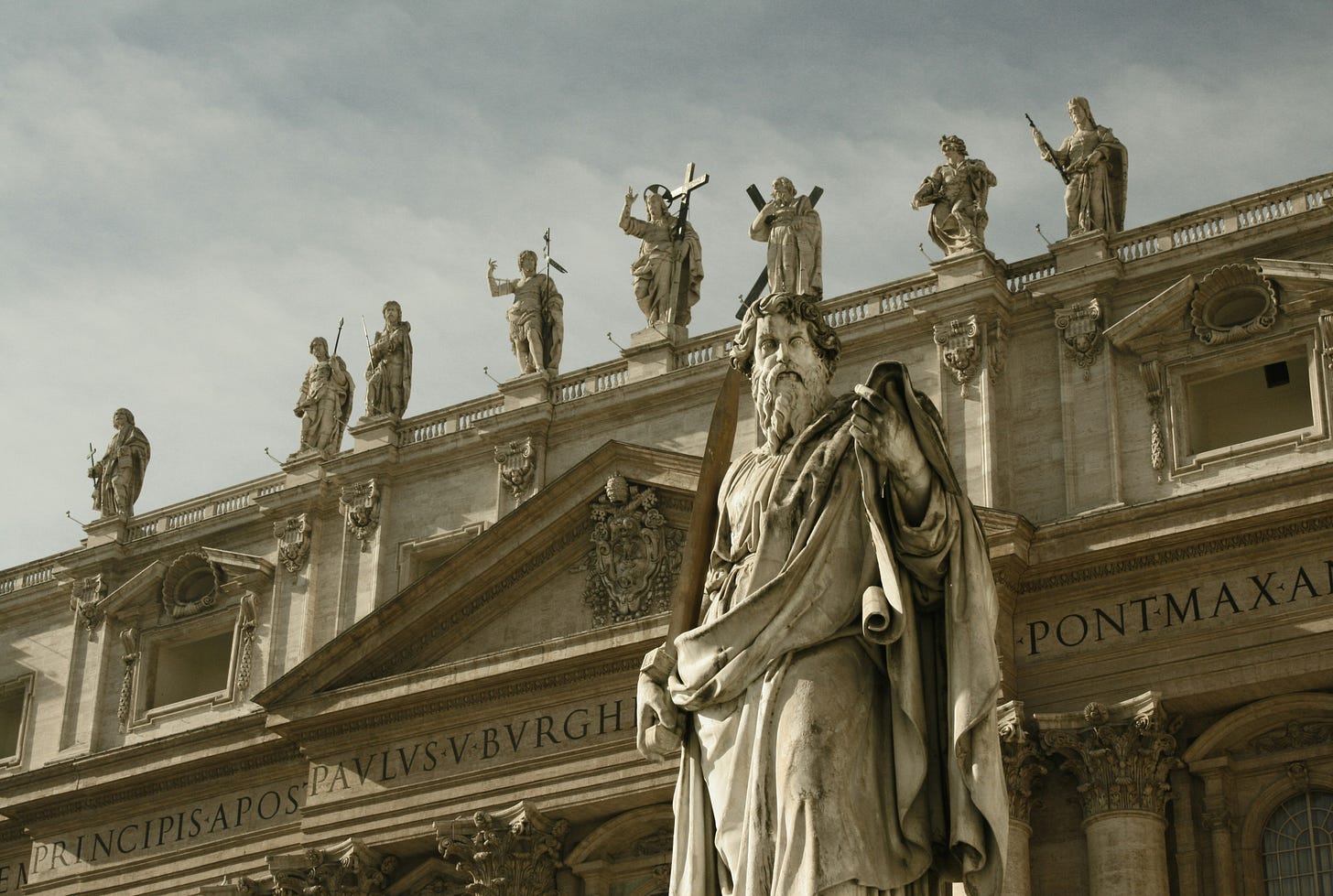How Do We Submit?
Part 1 of 3 on Paul's Meaning In Romans 13:1-7
Hello Reader! This month, I’ll share an essay on Paul’s meaning in Romans 13:1-7 that I wrote for a recent class at Northern Seminary co-taught by Drs. Tim Gombis and Nijay Gupta in three parts.
This passage is a touchy subject, especially with its opening, “submit to the governing authorities” line that leaves Christians with a lot of questions.
This text also has a checkered past, being used by the Nazi party to endorse totalitarian rule and in apartheid South Africa. It is not without its controversy!
In this series, I hope to shed some light on what Paul is trying to do here as well as point out some modern assumptions that get imported into the text that make it harder to understand.
May 2 - I’ll share a little background and my own motivation for writing this
May 16 - For you Greek nerds, this is when we will get into the nitty-gritty of the text itself.
May 30 - I’ll offer some contextual considerations and my own comments for helpful interpretation
In addition to the actual text of the essay I wrote, you will see addendums at the end of each part, which include some added elements I did not have space to discuss in the original paper.
Welcome to Part 1.
Since I already offered some explanatory comments above, I’ll say little here.
As a pastor in the times we live in, I felt an urgency to understand this text for myself, especially to what extent Paul expects Christians to “submit to governing authorities.”
Today is mostly background for understanding Paul’s letter and the context of the Roman church. Let’s get to it…

The interpretive history of Romans 13:1-7 is highly contested, leading some to describe Paul’s words as a “problem” text.1 Indeed, the text has been subject to misuse throughout history, notably in Nazi Germany and in more recent years as a rebuke to Christians who criticized then President Trump’s immigration policies.2
With so much terrible history surrounding this text, one wonders what Paul had in mind by writing it to the church in Rome. In this series, we will examine this question by exploring the historical background and analysis of the passage before offering some interpretive possibilities for our own day.
Background
Romans is one of the undisputed letters of the Pauline corpus,3 and was likely written sometime between 55-58 AD.4 Paul’s longest and likely most famous letter is unusual when compared to his other undisputed letters since he had no prior relationship with the church in Rome.5
Luke Timothy Johnson sees Paul’s purpose for this letter as part of a larger fundraising effort for his mission toward Spain. By providing a robust theological vision, Paul hoped they could financially contribute to his journey westward.6
Gorman suggests that, while financial support was part of the goal, Paul’s purposes were a bit broader including writing the church a theological treatise, a summary of his own teaching to introduce himself, and to help bring together the multi-ethnic congregations in unity, concluding with Michael Bird an, “‘eclectic’ view of the purpose(s) of Romans.”7
Gaventa, however, offers the most straightforward and helpful purpose for writing this letter, which is inclusive of all other hypotheses: that is the event of Jesus Christ.8
This event, writes Gaventa, “is obvious, but it is easily forgotten, and that forgetting has serious consequences.”9 All of life is “intruded upon” as Christ redefines every category and aspect of life.
As we look forward to 13:1-7 and its interpretation, this purpose will become highly necessary for understanding what Paul is trying to do and, crucially, what he is not trying to do.
Paul’s apocalyptic and eschatological re-framing of reality in Christ will not neatly put this text in a particular “camp” but will try to outline the shape of the church living in relationship to governing authorities in light of Jesus’ work.
Paul’s audience, the church at Rome, also provides contextual clues to the study of this passage. Rome, the center of imperial power and culture, was built upon honor, shame and a highly stratified, socio-economic, religious and political world.
All of these were wrapped up together in faithful loyalty to the Roman deities and by extension the emperors, which kept justice and virtue established in Rome. This focus on power and might to hold together Rome meant that humility was not a respectable trait for one to possess.10
An event like the Christ event, focused on a humiliated man hung on a tree in a fashion unspeakable in Roman society, would not have qualified as good news in their eyes, let alone a category-changing climax of history.11
Additionally, the church had experienced some upheaval over the preceding years. Jews had been exiled from Rome by Claudius over fights about the identity of Jesus Christ and returned after the emperor’s death.
In the meantime, Gentiles had taken over complete leadership of the church communities in Rome, which created tension that, Gorman suggests, Paul is describing in Romans 14 and 15.12
Since Jewish messianic belief was highly “anti-oppressor,” this group’s return to Rome could have been cause for concern for local Romans and may have included the possibility of some returning Jewish Christians calling for a tax protest.13
Thus, in light of Gaventa’s proposed purpose for the letter, Paul wants to help the Gentile and Jewish community reacclimate to life together, embedded in Rome, humbly living out the Christ Event.
Addendum
As we begin our exploration into what Paul may have meant by Romans 13:1-7, it is important to stress Paul’s pastoral role with the churches to which he wrote letters.
Paul was not only writing a theological treatise, but he also had an interest in the physical survival of the people in these church communities.
Remember, this is a time in history when the church was minuscule, and being located in the heart of the Roman Empire might have put these Christians under more threat than most around the Empire.
As we unpack some of the textual and commentary issues in this passage, we need to keep in my the social location from which Paul is coming.
They are marginalized people. They have no power in society. The government is not necessarily out for their good. How would one write to people like that?
Paul is already getting quite radical in suggesting that they humble themselves, something that was not a virtue for Romans.
What other ways might Paul be asking them to be radically different than the culture around them?
Charles D. Jr. Meyers, “‘Romans, Epistle to The.,’” in The Anchor Yale Bible Dictionary, ed. David Noel Freedman, vol. 5 (New York: Doubleday, 1992), 827.
Lincoln Mullen, “The Fight to Define Romans 13,” News Site, The Atlantic, last modified June 15, 2018, accessed February 28, 2025, https://www.theatlantic.com/ideas/archive/2018/06/romans-13/562916/.
Michael J. Gorman, Romans: A Theological and Pastoral Commentary (Grand Rapids, Michigan: William B. Eerdmans Publishing Company, 2022), 9.
Gorman, Romans: A Theological and Pastoral Commentary, 23.
Beverly Roberts Gaventa, Romans: A Commentary (Louisville, KY: Westminster John Knox Press, 2024), 58.
Luke Timothy Johnson, The Writings of the New Testament: An Interpretation, 3rd ed. (Minneapolis, MN: Fortress Press, 2010), 304.
Gorman, Romans: A Theological and Pastoral Commentary, 24.
Beverly Gaventa R., Romans: A Commentary, 1st ed. (Westminster John Knox Press, 2024), 59–60, accessed February 27, 2025.
Gaventa, Romans: A Commentary, 59.
Gorman, Romans: A Theological and Pastoral Commentary, 30–31.
See Martin Hengel, Crucifixion in the Ancient World and the Folly of the Message of the Cross, 1st American ed. (Philadelphia: Fortress Press, 1977). Chapters 5 and 6 especially for how the cross was viewed by Romans.
Gorman, Romans: A Theological and Pastoral Commentary, 24–25.
Gorman, Romans: A Theological and Pastoral Commentary, 254.



